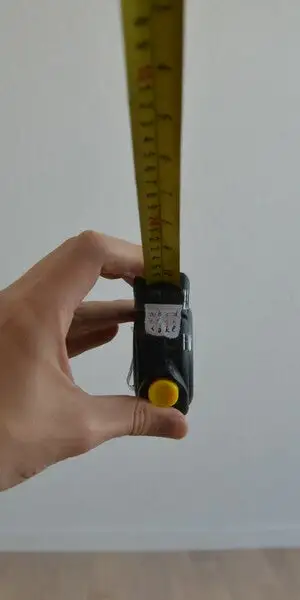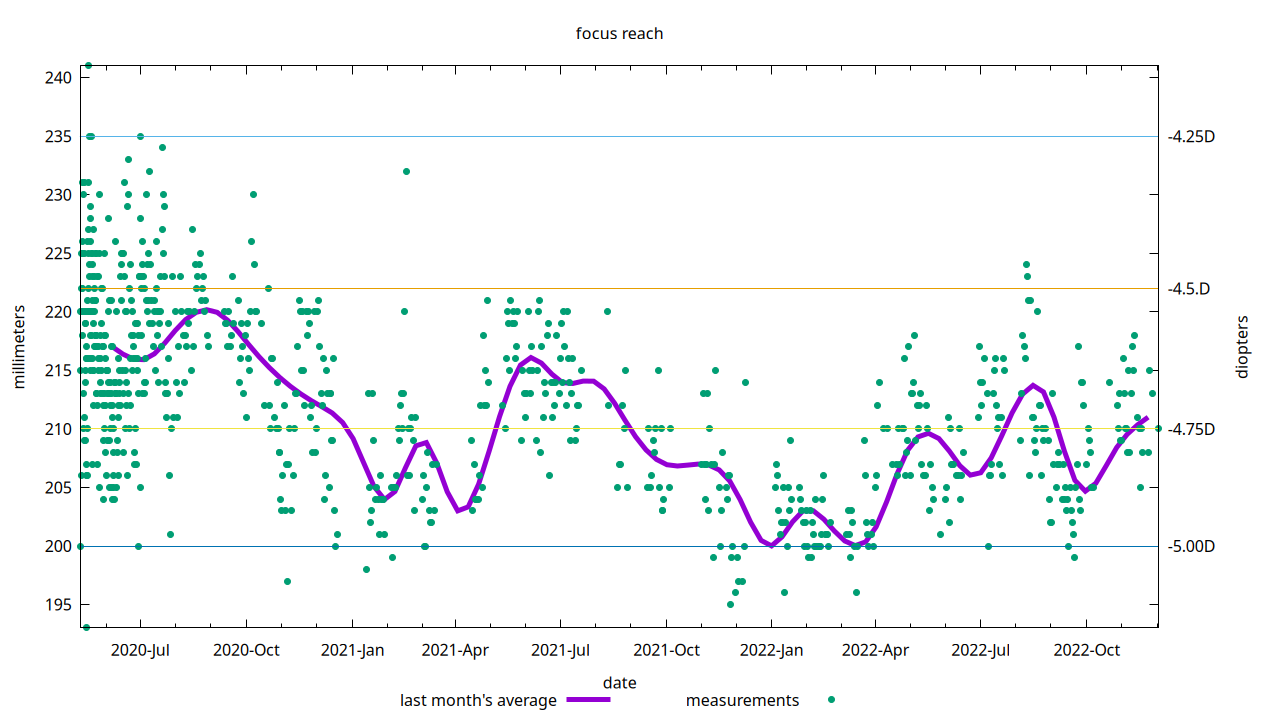# myopia: humanity will be installing violet lightbulbs everywhere
i'm nearsighted which means i can only see perfectly up to very short distances. i have an about -5D myopia which means i can see perfectly only up to 100 cm / 5 = 20 cm. it means i have to wear glasses in order to function in the world. it's annoying but it's not the end of the world.
# measurements
i feel that every time i got glasses for 100% correction, my eyes quickly got used to them and then my eyesight worsened faster than before the new glasses. unfortunately i never really measured this. this lack of measurement annoyed me so in 2020 and 2021 i decided to measure my eyesight daily.
given that my vision hovers around 20 cm, it's very easy to do it by hand. you can do it with a measuring tape. you put some detail on it, pull it from your head until it starts becoming blurry and then note the distance:

initially i was quite enthusiastic and did a lot of measurements. and then i dropped to daily and then i stopped altogether. here are my measurements:

it's super noisy data. a lot depends on the light levels, time of day, tiredness, etc. i'm just not rigorous enough to create a stable environment enough for this. but if i squint enough, i do see a pattern which suggests that during winter my eyesight worsens more.
note to self: all the data is in @/focusreach.data. the data format is `yyyymmdd-hhmm central left right comment`. and the script to convert the data to the graph is at @/focusreach.plot.
another personal note, here are my official measurements done by professionals since i started tracking (i'll keep this updated whenever i visit an optician):
# endmyopia
as far as i'm aware, the scientific consensus is that the myopia is not reversible through natural means. then there's the endmyopia community which claims otherwise.
during my measuring time i followed this endmyopia community. their method is roughly described at their wiki at https://wiki.endmyopia.org/wiki/Guide:Start_your_improvement_here. when doing close-up work use separate glasses that corrects for that distance. and be a lot outside, do lot of "active focusing", which is a special exercise.
the forum does have some people for whom the method did work. but it requires lot of constant work. and from what i can read from the posts, it's very easy to regress. you stop the active time investment and you lose your progress. i recall that even jake, the community's founder, reported regression at some point when he stopped the exercises for a longer while.
i'm totally not cut out for investing the time into this and then maintaining that time investment. i've thought a lot about this but gave up even before i started.
# surgery
i did consider surgery too. lot of people went through it and they are happy with the results. but i also know some folks for whom the eyesight regression continued even after the surgery. one person was about 40 years old, -9-ish eyesight, got surgery and after a few years she had to wear glasses again.
given i noticed the regressions after each stronger glasses, i imagine i would fall into the same category. so a surgery would be a temporary relief. and it's a surgery which comes with non-trivial risks. lot of people report overly dry eyes and double vision after such surgeries. i already experience dry eyes sometimes, it could become even worse. just writing about it makes them dry again, ugh.
another aspect i fear losing is the good closeup accuracy. i spend a lot of time freewriting (see @/inspiration). that means lot of closeup work that i do without wearing any glasses. currently this is very convenient and comfortable activity. but i fear that after correcting my eyes, this might become more tiresome or i might start needing reading glasses for this much sooner than without the surgery. i also like having the perfect closeup vision during intimate times too.
given that i can live with glasses and i like the extra closeup accuracy, for now i decided to avoid any surgeries.
# alternatives
i could wear contacts too but i'm too squeamish about them (or anything that comes near my eyes). i guess i could get used to them after a while but dunno, i like the simplicity of glasses.
and i'm aware of bunch of alternatives to lasik operation: lasek, lens implants, epi-lasik, lens exchange, etc. dunno, they feel similarly scary as lasik to me if not more.
# acceptance
most of the time i don't even notice the glasses are on me. however they get annoying in some situations:
the situations are quite limited. and they are quite rare events for me given that i just live at home in front of the computer anyway. so i can just accept the tradeoffs here and move on. which i'm doing for now.
# glasses
another annoying thing about glasses is that they are super expensive for some stupid reason that the internet can explain better than me. your insurance might cover some of the costs though. if that's not possible, there are dozens of websites where you can order from for relatively cheap. you can probably order 3-5 of them for the cost for a single eyewear in the local shops. surely at least one of them will be a good fit.
# kids
i skimmed quite a few articles about myopia progression. the recent studies suggest that screen time doesn't really correlate with the progression. all that matters that kids have to be outside long enough every day.
so if you are looking for a rule of thumb for screen management then i'd say this: only allow screen time after some adequate outdoor time. the amount of screen time probably doesn't matter too much from the eyesight perspective. (the allowed content on the screen is a completely different topic though.)
while i try to strive for this with my kid so at least the problem is less severe for the next generation. but boy, managing kids is super hard. and if he ends up needing glasses, there are some non-invasive treatments that claim to slow the progression. i haven't done much reading on this yet, but i might look into using those high tech dims lenses for his glasses. i hope there will be even more reliable advice available by the time he gets to this phase. anyway, we'll see how things go.
# my prediction
here's one relative recent attempt at explanation of myopia mechanics that i found (from 2016): "Violet Light Exposure Can Be a Preventive Strategy Against Myopia Progression", https://www.ncbi.nlm.nih.gov/pmc/articles/PMC5233810/. the only downside that it still talks about chicken, not humans.
there's one interesting implication i'm making from just alone the title: all those contact lenses and glasses that filter out all the "harmful rays" from the sunlight? they might be making our myopia worse. the article actually confirms this, see section 3.6.
i predict one day we will be replacing our lightbulbs with violet light emitting ones and they will be always on inside. once that's done, the myopia problems might subside a little bit for the next generation. at least until our grandchildren forget why those lights are there in the first place, remove them for efficiency, and then the myopia epidemic starts again.
that, or after the ai singularity we can edit myopia out of our genes, assuming the machines allow us to continue living and breeding.
# links
for my own reference, here are some random links i've collected over time. maybe one day i'll get to read them:
published on 2023-04-15
Add new comment:
(Adding a new comment or reply requires javascript.)